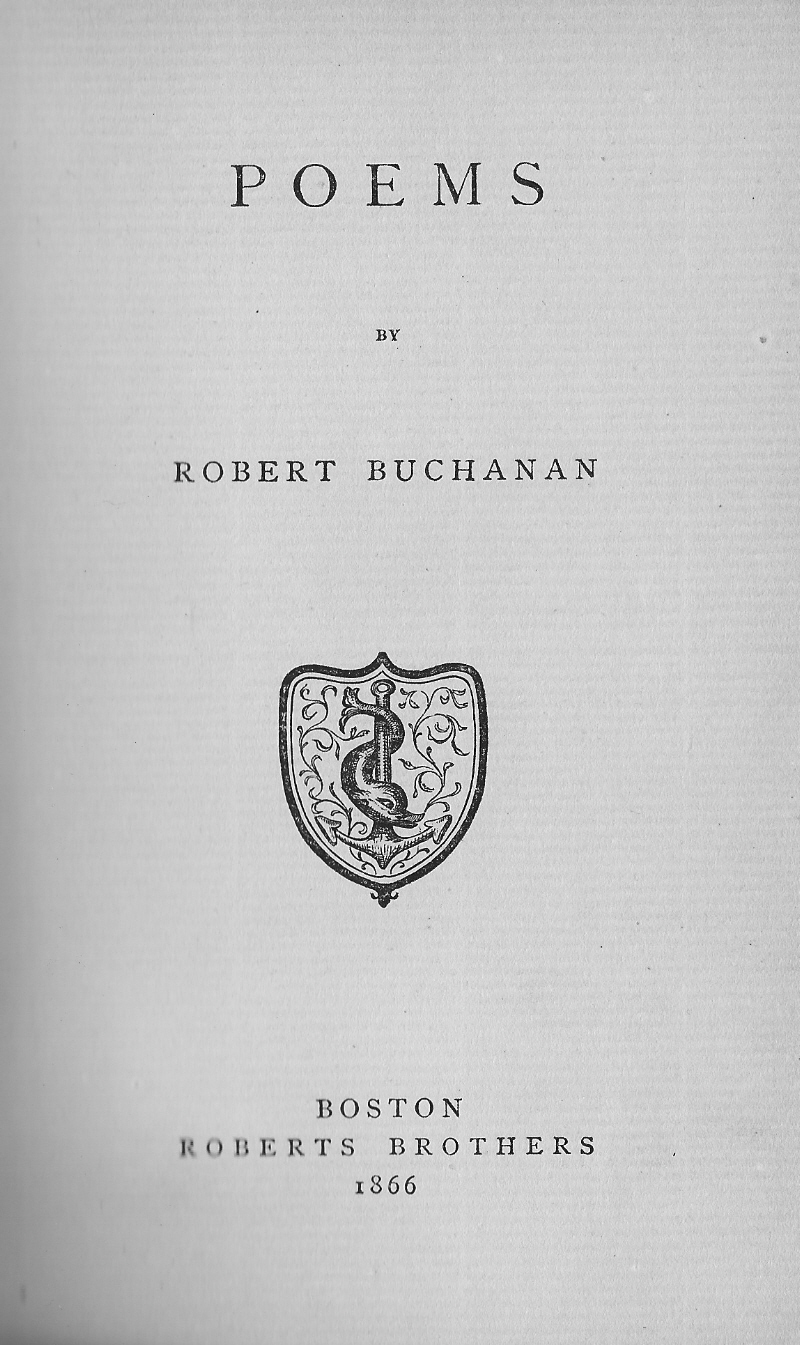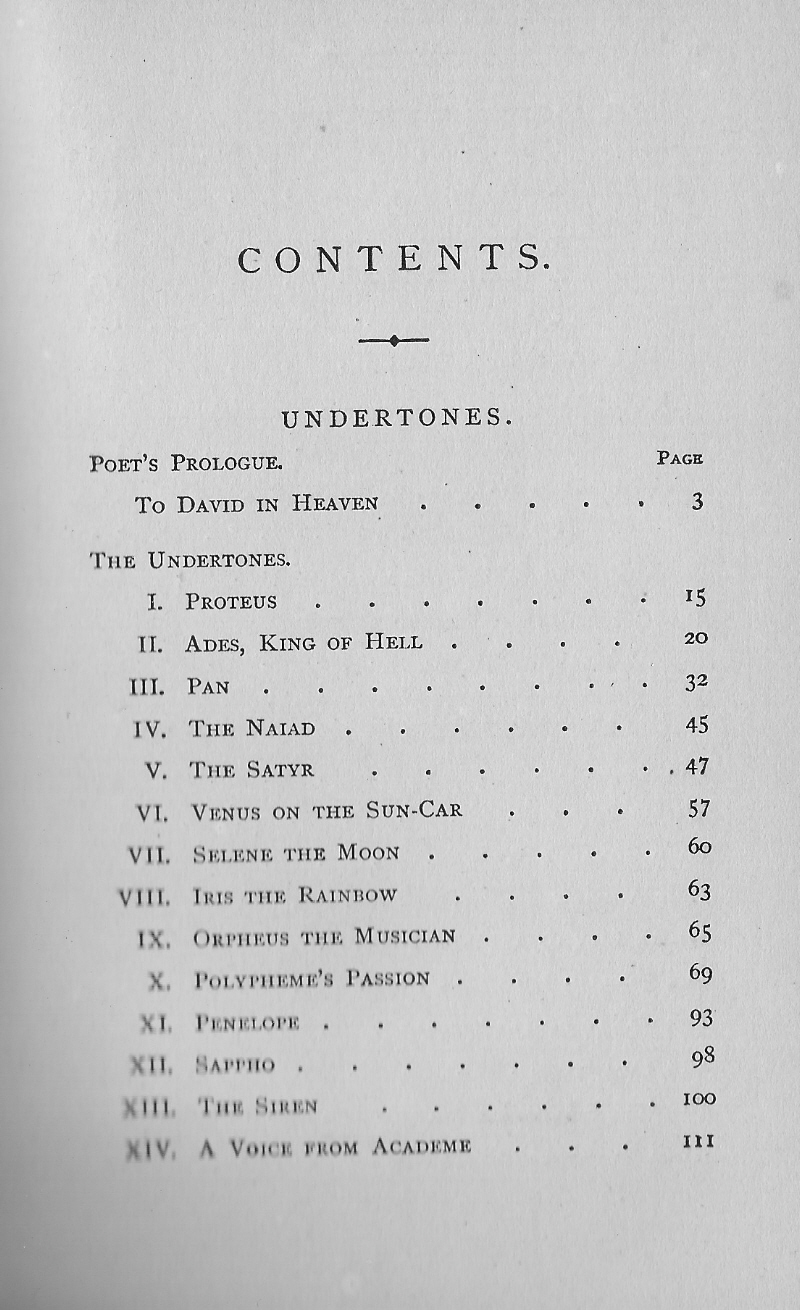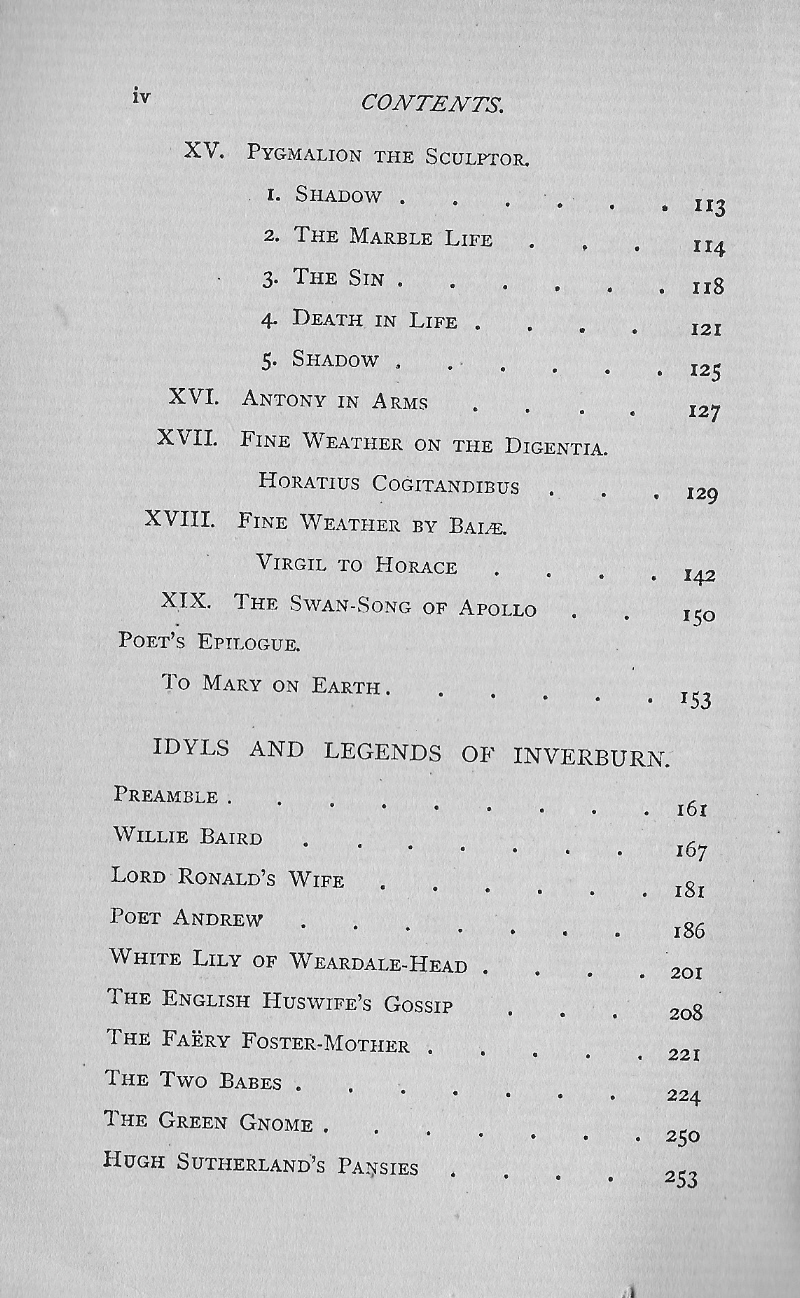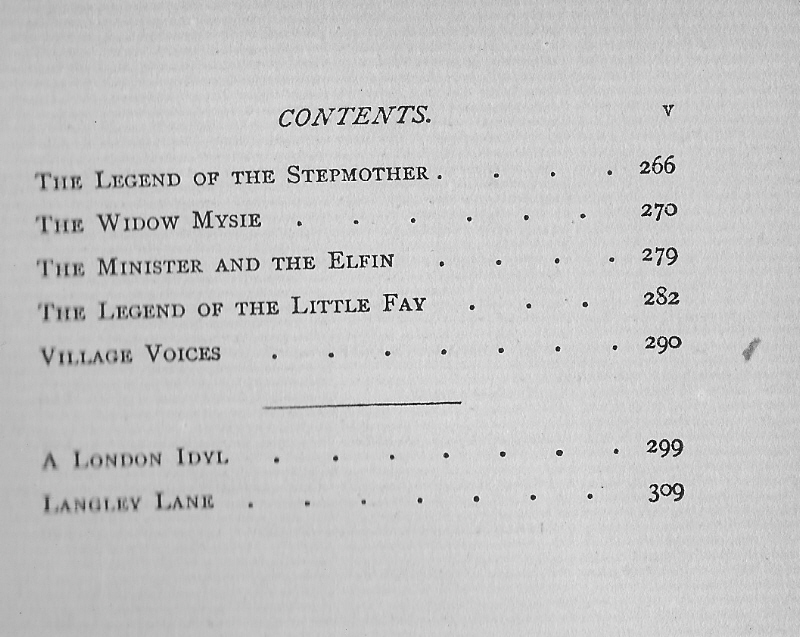|
Undertones - the revised edition published by Strahan in 1865.
Idyls and Legends of Inverburn - the first edition published by Strahan in 1865.
‘A London Idyl’ - from The Fortnightly Review, July, 1865. A revised version, retitled ‘Liz’, was included in London Poems. This is the original version:
A LONDON IDYL.
I.
HEY, rain, rain, rain!
It patters down the glass and on the sill,
And splashes underneath, along the lane,—
Then gives a kind of scream, and lies quite still:
One likes to hear it, tho’, when one is ill:
Rain, rain, rain, rain!
Hey, how it pours and pours!
Rain, rain, rain, rain!—
A weary day for poor girls out-o’-doors!
II.
Ah, don’t! that kind of comfort makes me cry,
And, Parson, since I’m bad, I want to die.
The roaring of the street,
The tramp, tramp, tramp, of feet,
The sobbing—sobbing of the weary Rain,
Have gone into the aching of my brain.
I’m lost and weak, and can no longer bear
To wander like a shadow here and there,—
As useless as a stone,—tired out,—and sick!
So that they put me down to slumber quick,
It does not matter where.
No one will miss me; all will hurry by,
And never cast a thought on one so low;
Fine gentles miss fine ladies when they go,
But folk care nought for such a thing as I.
III.
’Tis bad, I know, to talk like that,—too bad!
Joe, tho’ he’s often hard, is strong and true—
[Ah, Joe meant well!] and there’s the Baby too!—
But I’m so tired and sad.
I’m glad it was a boy, sir, very glad.
A man can fight along, can say his say,
Is not look’d down upon, holds up his head,
And at a push can always earn his bread:
Men have the best of it, in many a way.
But ah! ’tis hard indeed for girls to keep
Decent and honest, tramping in the town,
Their best but bad,—made light of,—beaten down,—
For ever wearying, wearying, for sleep.
If they grow hard, go wrong, from bad to badder,
Why, Parson dear, they’re happier being blind:
They get no thanks for being good and kind,—
The better that they are, they feel the sadder!
IV.
Nineteen! nineteen!
Only nineteen, and yet so old, so old;—
I feel like fifty, Parson—I have been
So wicked, I suppose, and life’s so cold!
Ah, cruel are the wind and rain and snow,
And I’ve been out for years among them all:
I scarce remember being weak and small
Like Baby there,—it was so long ago.
It does not seem that I was born, but woke
One day in a dark room
High up among the smoke,
And trembled at the roaring of the gloom
That hung around me [for you could not see
The people from our window,—only stone,—
Deep walls, black pits, and lanes—tho’ drearily
You heard the deep streets groan];
And I was all alone, and looking out,
And listening in a dream;
And far between the housetops was a gleam
Of water winding silver-like about.
That was the River. It look’d cool and deep,
And as I watch’d, I felt it slipping past,
As if it smoothly swept along in sleep,
Gleaming and gliding fast;
And so I lean’d upon the sill and hearken’d
To the strange hum, while all the roofs became
Cover’d with thin sick flame,
And with a dusky thrill the River darken’d;
Till coldly, coldly, on the roofs there lighten’d
A pale sad silver light from heaven shed,
And with a sweep that made me sick and frighten’d
The yellow Moon roll’d up above my head;
And down below me groan’d the noise and trade,
And O! I felt alive, and was afraid,
And cold, and hungry, shrieking out for bread.
V.
All that is like a dream! It don’t seem true!—
Father was dead and mother left, you see,
To work for little brother Ned and me,
And up among the roofs we grew and grew;
Lock’d in whole days high up, while mother char’d
In people’s houses; only now and then
We slipt away into the streets, and stared
At the big crowds of women and of men.
And I was six, but Ned was only three,
And thin and weak and weary; and one day,
While mother was away,
He put his little head upon my knee,
And went to sleep, and would not stir a limb,
But look’d quite strange and old,
For when I touch’d him, shook him, spoke to him,
He smiled and grew so cold;
Then I was frighten’d and cried out, and none
Could hear me, and I sat and nursed his head,
Watching the smoky window while the Sun
Peep’d in upon his face and made it red;
And I began to cry;—till mother came,
Knelt down and scream’d, and named the good GOD’S name,
And told me he was dead.
Well, when she put his night-gown on, and weeping
Put him among the rags upon his bed,
I thought that brother Ned was only sleeping,
And took his little hand and felt no fear;
But, when the place grew grey and cold and drear,
And the round Moon came creeping, creeping, creeping,
Over the roofs and put a silver shade
All round the cold, cold bed where he was laid,
I sobb’d and was afraid.
VI.
Ah, yes, it’s like a dream!—for time pass’d by,
And I went out into the smoky air,
Fruit-selling, Parson,—trudging wet or dry,—
Winter and summer,—weary, cold, and bare;
And when old mother laid her down to die,
And parish buried her, I did not cry,
And hardly seem’d to care;
I was too hungry and too dull; beside,
The roar o’ streets had made me dry as dust:
It took me all my time, howe’er I tried,
To keep my limbs alive and earn a crust;
I had no time for weeping,
And when I was not out amid the roar,
Or standing frozen at the play-house door,
Why, I was coil’d upon my straw, and sleeping.
Ah, pence were hard to gain!
Some girls were pretty, too, but I was plain:
Fine ladies never stopp’d and look’d and smiled,
And gave me money for my face’s sake.
That made me hard and angry when a child,
But now it thrills my heart and makes it ache!
The pretty ones, poor things, what could they do,
Fighting and starving in the wicked town,
But go from bad to badder,—down, down, down,—
Being so poor and yet so pretty too?
Never could bear the like of that,—ah no!
Better have starved outright than gone so low!
For often late at night
A face that I had known when mild and meek
Pass’d by with fearful smile and painted cheek,
Gleam’d in the gas, and faded out of sight.
VII.
But I’ve no call to boast. I might have been
As wicked, Parson dear, in my distress,
But for your friend,—you know the one I mean?—
The tall pale lady in the mourning dress.
Though we were cold at first, that wore away,—
She was so mild and young,
And had so soft a tongue,
And eyes to sweeten what she loved to say.
She never seem’d to scorn one, no, not she,
And (what was best) she seemed as sad as me!
Not one of those that make a girl feel base,
And call her names, and talk of her disgrace,
And frighten one with thoughts of flaming Hell
And fierce LORD GOD with black and angry brow,
But soft and mild, and sensible as well,
And O I loved her, and I love her now.
She did me good for many and many a day,—
More good than pence could ever do, I swear,
For she was poor, with little pence to spare,—
Learn’d me to read and quit low words,—and pray.
And, Parson, tho’ I never understood
How such a life as mine was meant for good,
And could not understand
How one she said was wicked, ever could
Go to your better land
Among a troop so grand,
I liked to hear her talk of such a place,
And thought of all the angels she was best,
Because her soft voice soothed me, and her face
Made my words gentle, put my heart at rest.
VIII.
Ah! sir, ’twas very lonesome. Night and day,
Save when the sweet Miss came, I was alone;
Moved on and hunted thro’ the streets of stone,
And ev’n in dreams afraid to rest or stay.
Then, other girls had lads to work and strive for,
I envied them, and did not know ’twas wrong,
And often, very often, used to long
For some one I could like and keep alive for.
Marry? Not they!
They can’t afford to be so good, you know;
But many of them, tho’ they step astray,
Indeed don’t mean to sin so much, or go
Against what’s decent. Only ’tis their way.
And many might do worse than that, may be,
If they had ne’er a one to fill a thought,—
It sounds half wicked, but poor girls like me
Must sin a little, to be good in aught.
IX.
So I was glad when I began to see
That costermongering Joe had fancied me;
And when, one night, he took me to the play
Over on Surrey side, and offer’d fair,
That we should take a little room and share
Our earnings, why, I could not answer “nay!”
And that’s a year ago; and tho’ I’m bad,
I’ve been as true to Joe as girl could be;
I don’t complain a bit of Joe, dear lad,
Joe never, never meant but well; and we
Have had as fresh and fair a time, I think,
As one could hope, since we are both so low:
Joe likes me, never gave me push or blow,
When sober: only, he was wild in drink.
But then, we don’t mind beating when a man
Is angry, if he likes us and keeps straight,
Works for his bread and does the best he can;—
’Tis being left and slighted that we hate.
X.
And so the Baby’s come, and I shall die!
And tho’ ’tis hard to leave poor Baby here,
Where folk will think him bad, and all’s so drear,
The great LORD GOD knows better far than I.
Ah, don’t!—’tis kindly, but it pains me so!
You say I’m wicked, and I want to go!
“GOD’S kingdom,” Parson, dear? Ah nay, ah nay!
That must be like the country,—which I fear:
I saw the country once, one summer day,
And I would rather die in London here.
XI.
For I was sick of hunger, cold, and strife,
And took a sudden fancy in my head
To try the country, and to earn my bread
Out among fields, where, I had heard, one’s life
Was easier and brighter. So, that day,
I took my basket up and stole away,
Early at morning. As I went along,
Trembling and loath to leave the busy place,
I felt that I was doing something wrong,
And fear’d to look policemen in the face.
And all was dim: the streets were gray and wet
After a rainy night: and all was still;
I held my shawl around me with a chill,
And dropt my eyes from every face I met;
Until the streets began to fade, the road
Grew fresh and clean and wide,
Fine houses where the gentlefolk abode,
And gardens full of flowers, on every side:
That made me walk the quicker,—on, on, on,—
As if I were asleep with half-shut eyes,
And all at once I saw to my surprise
The houses of the gentlefolk were gone,
And I was standing still,
Shading my face, upon a high green hill,
And the bright sun was blazing,
And all the blue above me seem’d to melt
To burning flashing gold, while I was gazing
On the great smoky cloud where I had dwelt.
XII.
I’ll ne’er forget that day. All was so bright
And strange. Upon the grass around my feet
The rain had hung a million drops of light;
The air, too, was so clear and warm and sweet
It seem’d a sin to breathe it. All around
Were hills and fields and trees that trembled thro’
A burning blazing fire of gold and blue,
And there was not a sound,
Save a bird singing, singing, and a kind
Of sighing from the grass upon the ground.
I turn’d away, like one grown deaf and blind.
Then, with my heavy hand upon my chest,
Because the bright air pain’d me, trembling, sighing,
I stole into a dewy field to rest,
And O! the green green grass where I was lying
Was fresh and living,—and the bird sang loud,
Out of a golden cloud.—
And I was looking up at him and crying!
XIII.
The hours they slipt away; and by-and-by
The sun grew red, big shadows fill’d the sky,
The air grew damp with dew,
And the dark night was coming down, I knew.
Well, I was more afraid than ever then,
And felt that I should die in such a place;—
So back to London town I turn’d my face,
And crept into the great black streets again;
And when I breathed the smoke and heard the roar,
Why, I was better, for in London here
My heart was busy, and I felt no fear.
I never saw the country any more.
And I have stay’d in London well or ill,
I dared not stay out yonder if I could,
For one feels dead, and all looks pure and good,—
I could not bear a life so bright and still.
All that I want is sleep,
Under the flags and stones, so deep, so deep!
GOD won’t be hard on one so mean, but He
Perhaps will let a tired girl slumber sound
There in the deep cool darkness underground;
And I shall waken up in time, may be,
Better and stronger, not afraid to see
The great still Light that folds Him round and round!
XIV.
See! there’s a bit of sunshine thro’ the pane,—
How cool and moist it looks amid the rain!
I like to hear the splashing of the drops
On the house tops,
And the loud humming of the folk that go
Along the streets below!
I like the smoke and roar,—I am so bad,—
They make a low one hard and still her cares . . .
There’s Joe! I hear his foot upon the stairs!—
He must be wet, poor lad!
He will be angry, like enough, to find
Another little life to clothe and keep,
But show him Baby, Parson,—speak him kind,—
And tell him Doctor thinks I’m going to sleep.
A hard hard life is his,—he need be strong
And rough, to earn his bread and get along;—
I think he will be sorry when I go,
And leave the little one and him behind.
I hope he’ll see another to his mind
To keep him straight and tidy. Poor old Joe!
___
‘Langley Lane’ - from London Poems, originally published in Good Words, August, 1865.
_____
Next: The Poetical Works of Robert Buchanan (1874)
or back to Collections Menu
|



